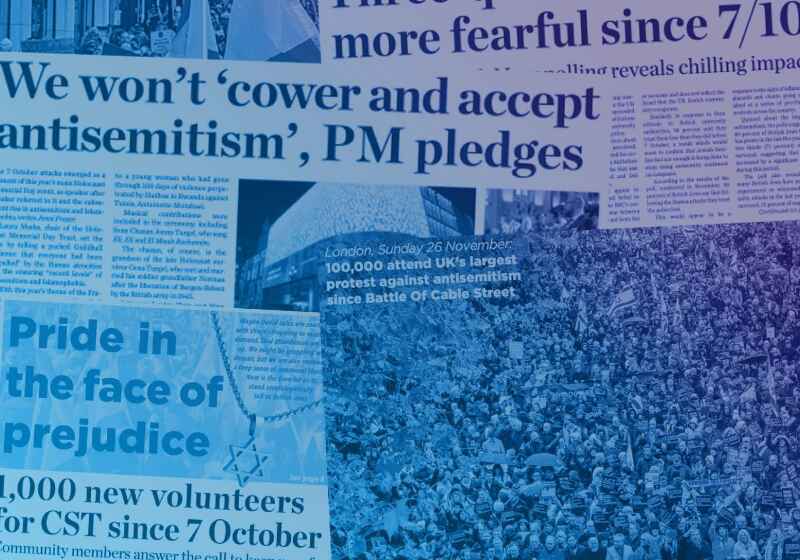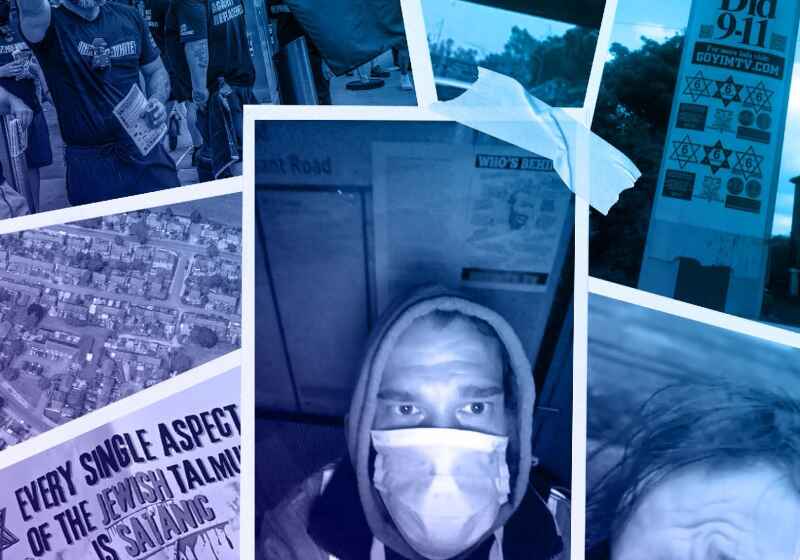CST Blog
Lessons From Nick Griffin and Jeremy Corbyn.
1 May 2012
In recent days, the British National Party leader Nick Griffin, and the Labour Partys Jeremy Corbyn MP, have unwittingly demonstrated how modern day antisemitism and anti-Zionism work; and how people respond to them.
On 19th April 2012, Griffin reacted on Twitter to five far right activists having been arrested by counter-terror Police on suspicion of Public Order offences:
Govt using naked repression of free speech now. After arrest of our Mike Coleman in Stoke, key members of North West Infidels arrested today. Dawn raids for thought crime - Cameron a slimy Big Brother. Arrests also in Yorkshire...More arrests ongoing. Looks like State taking out those who refuse to be Zionist puppets...
The BNP and Griffin come from a Nazi tradition, making it legitimate to argue that when Griffin says State taking out those who refuse to be Zionist puppets, he is using the language of anti-Zionism as an expression of antisemitism.
Where 70 years ago the BNP equivalent would have said that the State was under the thumb of Jews, or Big Jews or Jewish Capital, today they say Zionist. No matter, the underlying meaning and impact is straightforward.
But what if someone else, someone who isnt of this stripe, echoes Griffins depictions of Zionist naked repression of free speech; and of Zionist control ensuring that those who dont toe the line are singled out for legal oppression?
Step forward, Jeremy Corbyn MP, a man who is most certainly not Nick Griffin. It is hard to think of two politicians further apart in their ideology, yet Corbyn has strongly backed calls for an independent inquiry into pro-Israeli lobby influence upon Government behaviour.
Of course, no MP would back an inquiry into the pro-Israeli lobby if the demand came from the BNP. Rather, this demand came from the supporters of Sheikh Raed Salah, the Israeli / Palestinian Islamist leader who was banned from entering the UK, but ultimately won his appeal against deportation. (The video footage of the inquiry demand is here: Salahs lawyer explains the need from 40secs in. Corbyn echoes it from 2min51secs in.)
The inquiry is supposedly required because
one might infer...a very serious problem with the Governments relationship to the pro-Israeli lobby.
One example cited is changing laws to protect alleged [Israeli] war criminals, but this inquiry demand is all about the Salah case. It includes a tentative suggestion that a certain Conservative Party funder is a trustee of CST and the Board of Deputies of British Jews. The suggestion is wrong, but the implication still lingers.
Neither Griffin, Corbyn nor Salahs team explicitly mentioned Jews, but there is an inescapable similarity between Griffin on the arrests of North West Infidels and the Corbyn-Salah crew on the house arrest of Raed Salah. Free speech is repressed through arrests.
Corbyn is assumed, understandably, to be entirely different to Griffin in his opinion of Jews (and Salahs team is totally not the BNP): but it is equally understandable that philosophical distinctions between pro-Israeli lobby and Griffins more crude Zionist puppets will be of little import for many Jewish observers, who fear the old antisemitic theme of Jewish financial control over politicians and lawmakers.
However affronted or surprised Corbyn and his ilk may be, it is the impact of such words that matters. It is their impact upon Jews, it is their impact upon antisemites and it is their impact upon antisemitism.
(See here for Corbyns response to some of the reporting of his inquiry support.)
How to concisely and accurately explain concerns over similar language, from political polar opposites, is an extremely important matter for CST, as it is for anyone looking to grapple with such issues.
Sadly, most of the far left, and way too much of the liberal-left and its media, are insufficiently concerned with grappling over the historically wrought language of todays anti-Zionism. Yes, these people say they care about antisemitism, but their concern is always strictly conditional, always upon their own terms, not upon that of the victims (or perpetrators).
The case was starkly put by Socialist Workers Party theorist, John Molyneux, who explained the progressive logic in his June 2008 article, More than opium: Marxism and religion.
To put the matter as starkly as possible: from the standpoint of Marxism and international socialism an illiterate, conservative, superstitious Muslim Palestinian peasant who supports Hamas is more progressive than an educated liberal atheist Israeli who supports Zionism (even critically).
Did you catch that? In plain English: if the situation relates to Zionism and you support Zionism (even critically) then you can forget about anti-racist solidarity from this section of political opinion; and from those who sympathise with it. (And that means Zionism as defined by the far left and/or its Islamist allies. It most certainly does not mean Zionism as defined by most Jews.)
The Raed Salah example has demonstrated that if a Palestinian (in this case, actually Israeli) Muslim is found to have pushed the old blood libel (ie the one about Jews using the blood of Christian children to make matzos at Passover), then thats just not relevant for his progressive allies. Similarly, the allegation that Salah pushed the new blood libel (ie the one about 4,000 Jews being pre-warned not to attend work in the Twin Towers on 9/11), appears irrelevant.
Worse, complain about Salah, as CST and others have done; and you risk being derided as a Zionist lackey, an agent of Israel, or simply a fool who cannot distinguish between antisemitism and mere so-called criticism of the acts of the Israeli state, as implied by senior Guardian figure, David Hearst, on the Guardians Comment is Free:
As the CST makes clear in its reports, there is a world of difference between antisemitism, anti-Zionism, and criticism of the actions of the Israeli state. All three discourses have their own dynamic. There are grave dangers in conflating the three.
Hearst, who both praised and criticised CST's work, is correct in the above summary of CST's reports, but (like so much of the Guardians Salah coverage) he only tells half the story. He neglects to say that CSTs reports also stress the way in which old antisemitic themes resonate within todays anti-Zionism. CSTs reports clearly do not attack criticism of the acts of the Israeli state, but they do attack the manner in which the ridiculously vast mythology of modern day anti-Zionism resonates with old antisemitic themes.
The history of antisemitism shows what Griffin's Zionists really are, but this is also why we fear Salah's input into our already fraught local dynamic.
In the case of Salah, move against him and you risk his supporters suggesting that this reveals a pro-Israeli lobby control mechanism over the Prime Minister and the Home Secretary; an anti-racist Labour MP champions their call for an inquiry, adding that he will take tea with Salah at Westminster; and, totally predictably, the Guardian sides with the oppressed Palestinian.
That is the state of anti-Zionism and antisemitism today. The situation may not suit depressingly large sections of self-styled progressive society, but it certainly suits Jewish communities far, far less.
Read More
CST meeting with Prime Minister Keir Starmer
2 December 2024

Antisemitic Discourse in Britain 2023
28 October 2024

Pathway to Terror
21 October 2024
